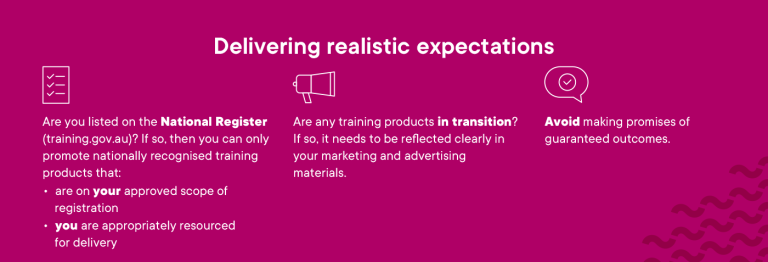- Home
- RTOs
- Focus on compliance
- ASQA | Spotlight On - Marketing and advertising, Chapter 2
ASQA | Spotlight On - Marketing and advertising, Chapter 2
Delivering on expectations
In this chapter of Spotlight On, we provide information about marketing nationally recognised training products and why you should avoid giving guarantees of outcomes.
When marketing to potential students, it is crucial to provide information that is clear, accurate and factual.
Promoting nationally recognised training products
Your training organisation needs to be listed on the National Register before you can enrol a student in a nationally recognised training product.
To promote a training product, it needs to be:
- on your approved scope of registration
- appropriately resourced for delivery.

Promoting training products in transition
If you have training products that are in transition, this needs to be clearly noted in the advertising materials.
Transitioning training products may impact:
- the duration of a student enrolment
- the requirements to switch to a different course, and the potential for students to complete additional training at extra costs.



Avoiding guarantees of outcomes
While advertising material can contain information on the benefits of the training product, it cannot include a guaranteed outcome of attainment or resulting employment.
A guaranteed outcome is not feasible. Even with the most robust process, there could be an unavoidable reason for a student to not complete a course or undertake employment.
Avoiding such guarantees protects the integrity of your organisation, as well as setting a reasonable expectation for potential students.
Inform students of pre-enrolment requirements
Potential students need to know if there are any expectations or requirements that could limit their ability to complete the course successfully. These expectations could include:
- access to necessary equipment
- access to a workplace
- any pre-requisite knowledge and experience.
Tips on delivering realistic expectations
Our infographic below summarises the key considerations of this chapter:

Case study
ASQA takes regulatory action against businesses who breach the National Vocational Education and Training Regulator Act 2011 (NVR Act) through misleading marketing.
The case study below is based on a real-life scenario.
A student, the witness, completed his online training course for a first aid certificate on 25 September 2019.
He received a ‘statement of attendance’ for completing ‘Basic First Aid’ with the Australian First Aid Shop. The certificate was for a $39.55 course he signed up for via the australianfirstaidshop.com.au website, owned by Enterprising Business Pty Ltd. The website purported to offer a VET statement of attainment, but this was a false claim because the company was not a registered training organisation (RTO) at the time.
As a result, an employer rejected the student’s security licence. The student was told that his ‘statement of attendance’ did not contain a course code.
When the student raised this issue with the certificate provider, he was issued a further certificate on 21 October 2019 which included the course codes HLTAID001, HLTAID002 and HLTAID003, which are nationally recognised training courses for first aid.
On 8 February 2022, Enterprising Business Pty Ltd Director Simon Brown was found guilty of breaching section 128 of the National Vocational Education and Training Regulator Act 2011 (NVR Act) by making false claims.
Victoria’s Magistrate Hugh Radford said an “aggravating factor” was that the company issued a second certificate with course codes and “continued with the ruse” while “knowing it was not a registered organisation”.
“It is not a trivial matter,” he said during the hearing at Ballarat Magistrates’ Court. The company was issued a fine and ordered to pay court costs.
More Spotlight On
- ASQA | Spotlight On - Marketing and advertising, Chapter 1
- ASQA | Spotlight On - Marketing and advertising, Chapter 3
Share
